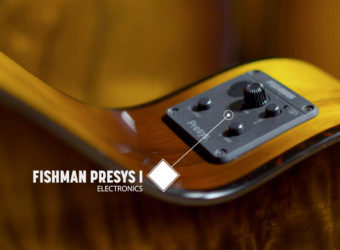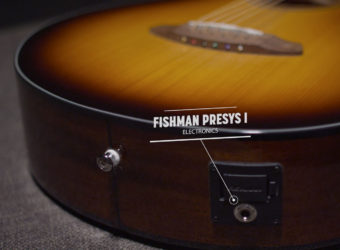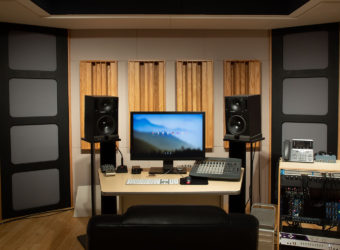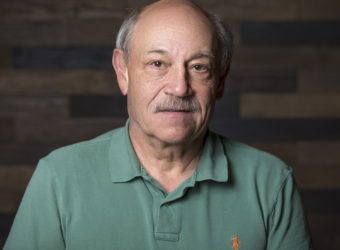Larry Fishman grew up in upstate New York and North Carolina and became involved in music in elementary school, going on to study and play cello and, later on, acoustic bass at N.C. State and Boston’s celebrated Berklee College of Music. He went on to play acoustic bass professionally throughout New England in a series of pit orchestras and jazz bands.
In the late 70s and early 80s, jazz was becoming more electronic in nature and Fishman was having serious problems amplifying his acoustic instrument to achieve parity on stage with electric pianos and guitars. Refusing to give up his acoustic bass for an electric equivalent, he started working on a pickup system for the bass. Analyzing every device available at the time, he experimented with new designs at home and on the bandstand at a jazz club in Cambridge with “horrible acoustics,” until he came up with an acoustic bass pickup that finally, as he puts it, “took it to the next level.”
Although Fishman fully intended to be a musician, the instant success of his first prototype pickup with acoustic bassists in the Boston area quickly grew into a full time business with an expanding range of acoustic pickups.
Since 1981, Fishman has been dedicated to helping musicians of all styles achieve the truest sound possible wherever and whenever they plug in. With over forty patents granted, engineer/musician Larry Fishman continues to combine science and art to deliver the next generation of innovative product design.
Breedlove is working with Fishman as the electronics partner for the new ECO Collection guitars. We had the chance to catch up with Larry for this exclusive interview.
Q. Over 40 years ago you made the first Fishman prototype in your basement. What was the “spark” – where did the inspiration come from to take this step and create your first design?
The spark that really drove me to create my first design was a self-need. I was playing a double bass in a jazz quintet and suddenly the piano was a Fender Rhodes rather than an acoustic piano and the band started getting louder and there was difficulty hearing my instrument. They were urging me to play electric bass, which I was not particularly interested in. So, having a background in materials and engineering and a machine shop in my basement, I decided to see if I can make a better double bass pickup than what was available at the time. And it was a challenge. And that’s really what got me started.
Q. You now hold more than 40 patents. What drives this passion for design and engineering?
The driving factor for design engineering is just a love for the exciting discoveries that you make when you dive into a new arena of some product or idea you have, and you have no idea how to do it. You get some hints, you get some techniques and tricks that you’ve pulled together over the years.
But it’s that creative sense that…well it’s kind of like playing in the jazz bands that I played in. You go in. There’s a tempo and there’s a chord and a chord chart. But that’s it. It’s a new experience every time I dive in. And it’s just a ton of fun. It’s really good. It’s satisfying. And when something surprising comes out of it, that’s really good, you just go, “Wow, that’s putting a big smile on my face.”
Q. Fishman is dedicated to helping musicians of all styles achieve the truest sound possible when they plug in. What is the hardest technical or development obstacle you’ve overcome in your career to deliver on your pursuit? Was there one monumental driving “problem” or obstacle you had to overcome – or you are still working to solve – that keeps you constantly innovating and pushing sound quality higher and higher?
You know, the thing that keeps me working on new designs and different approaches to amplifying musical instruments is the very nature of the guitar, the acoustic guitar that we focus on so heavily. These are beautifully expressive instruments that are very personal in nature and we’re not looking to transform them out of their own skin into something dramatically different. But we’re wanting to enhance that beautiful voice of acoustic instruments, instruments that feel alive in the hand. It’s much more personal than a piano. A guitar you have on your lap. You can feel the vibrations in the neck. You’re touching the strings. You’re not hitting a note, a hammer or something on a guitar. So, you’re really attached to it. The pursuit is to enhance that experience so that the technical aspects of what you bring to the design, never, ever get in the way of that organic feeling that you have when you’re just playing the instrument without the additional electronics.
We found some really innovative ways of enhancing that experience and they’ve been really satisfying for a lot of musicians. So we just keep diving in deeper. How do you become one with the instrument and have the instrument perform in a variety of venues at different volumes and different size rooms and so forth and still have it a rewarding, inspiring, comfortable situation for the performer?
Q. Do you see yourself as more of a designer and engineer, musician and artist, or all of the above?
When I first meet people and they asked me what I do, they’re a little confused. Are you a musician? Are you an artist? Are you an engineer or a designer or a businessman? Well, I’m everything and it all melts together. And that’s really, uh, those elements are necessary, at least I feel, for what I’m trying to accomplish at Fishman.
Engineering by itself will not produce inspiring beautiful products. Musical intuition by itself will not produce complete engineering designs. You have to have both ends of the spectrum working together, especially today where the tools are much more sophisticated and the technical aspects of how we can get to a certain point in a design are more complicated.
So you have to have a real strong material sense, a real strong engineering background, and really strong musical sense to put it all together so that it works. It works without stress… without being overly complicated and it works to create something that sounds beautiful and inspires musicians to create their sonic art with exciting new sounds and a very comfortable to play reliable scenario that does not get in the way of the music that they’re creating.
Q. To design these electronics and create so many patentable products, you must have a strong engineering left brain? As a musician, your right brain must really kick in when you want to get creative. This is somewhat of a philosophical question, but which hemisphere of your brain is more influential when creating electronics? Or, is it a blend of creativity and analytical problem solving?
Well, left brain, right brain to me… I really find that there’s a big difference. You know, it it’s kind of center brain. They’re all kind of spinning at the same time. And that’s what makes things work for me. I can get out the CAD system or start calculating ratios of things and so forth. Well, that’s important to have under control, but what’s the point? You really need to be looking at an end that is an artistic end. So, I can’t do anything without both of those motors working at the same time. That’s just the way I’m made. I’m thankful that I have that mix in me because it makes what I do easier and more productive and actually more fun, more enjoyable. So, I’m neither left nor right brain I’m right down the center and they’re both driving a car!
Q. One of the things many players love about your Fishman electronics is how easy they are to use, and how intuitive and simple everything is to use. Form seems to follow function, and everything is designed with real players in mind. Battery boxes are easy to access and make for quick onstage changes. Controls are side-mounted for easy access and the right “tools” are exactly where they need to be for players on stage.
When designing electronics for musical instruments, the function and the form are a mixed set of elements that can never, ever get in the way of a performer in a performance environment. My years of traveling with bands and playing live taught me what the challenges are in the always varying atmosphere and venue in different venues and different situations at different volumes… different musicians you’re interacting with. You really need to be able to focus on the music when you’re playing live and the gear has to really work for you without ever getting in the way. So, if you have to reach around in an awkward way to get to your tone controls or your volume controls or something, you’re automatically subtracting from the music that you’re trying to produce.
So, really getting that mix right. That blend right. And also just the sense of designs. You take a musical instrument and you add things to it. There has to be a proportion and a reason for them to go in certain places. And it also has to look good. So, we look at guitars, in particular, as objects of beauty.
When you work with an OEM and want to add things to their guitar, you have to be very cognizant of the design language of the guitar, what they’re looking for, the utility of what you bring to the table. But all in all, it’s all there for a reason. And that reason is making music.
Q. 40 Years after designing your first pickup, what’s something we take for granted now that you never imagined we’d have at your fingertips when you first started?
I think the thing that has evolved most in my work has been launching and the development of my company, Fishman Transducers.
We have a wonderful facility to work in. We have an amazing staff of engineers and production people and machinists, marketing and salespeople that are all driven by the same passion. And having a facility as complete as ours with amazing tools to create and invent and to analyze with, and with the passion of all the people that are involved in the building on an everyday basis.
“Wow. That sounds good. Can I hear that? What about this?” I never thought that was going to happen when we first started. It was kind of me and my basement. There was one other guy working on some stuff. We’re in such an enriching environment here now. Looking into the future and bettering ourselves and designing more creative products and breakthrough products.
So, I mean, you know, we could never have done that without the 40 years of building that has occurred. And now when we have an impossible task that someone’s asking us to do for them, it’s not nearly as impossible as anyone thought it would be. We take the impossible and make it possible. And that’s really exciting.
Q. What’s the single most important accomplishment you’ve achieved in your career. What are you most proud of?
Well, again, it’s really building the crew, the business and the people that are working here.
If you put them in an exciting, collaborative environment, everybody gets along, everyone gets to contribute it. I feel really good when I can take some really smart engineers and some really creative musicians and help them communicate with each other because they speak very, very different languages and that’s always something that can be very frustrating for the technical brain or the creative brain speaking a language that you can convey the good or the bad not, “Oh, I think that’s cool.” Or, you know these expressions that don’t really mean anything to an engineer or when an engineer is talking to a musician. They have to come together. And I think I’ve created an environment where that really, really works. And I’m very proud of that because this company is so much more than just Larry Fishman and it would never exist without these elements working in lockstep and thankfully, we’ve succeeded at that and quite surprising my son Bryan has decided to join the company almost two years ago. So, I’m really proud of that. I always wished he would, but he had his own very, very exciting career before that. But one day he decided to see if there’s a place for him here… and there certainly is! And this is going to allow Fishman to exist for another generation at least.
It’s pretty satisfying when I consider where we started and where we have come to and where we can go. That’s what I’m most excited about.
Q. With over 40 patents under your belt, what’s next? What’s the new frontier that keeps you up at night? What does the future hold for Fishman, and musicians around the world?
I really don’t know what the future is going to hold because things on a technical end have accelerated so rapidly. We’re doing things with signal processing chips that 15 years ago required a desktop computer or something even larger. Now with the emergence of consumer electronics, we have a little processor running on a 9-volt battery that is doing a huge amount of work that we could never have done before.
So as the ability grows – and since we’ve learned, to very successfully and satisfyingly, apply the digital realm to, really good sounding musical instruments – the world’s our oyster. Things that would have been so difficult or nearly impossible to do in the past are simply things that we take for granted today and apply it on a regular basis.
This will continue to accelerate. I’ve seen a massive growth in abilities over the past 10 or 15 years, and it looks like we’re going to get into another “jump” in the future years. So, I’m along for the ride. I’m going to be out there working with this stuff and I have no idea what we’ll create, but I bet it’s going to be fun and it’s going to be great. And it’s going to make great music.
You know, when I first met Tom Bedell, he was entering this industry after being in another business. And we met in Germany and I said, “Boy, this is a really interesting guy. I wonder what he’s gonna do? And we’ve been associated with Tom and his different brands over the years.
It’s really great to see what Tom has done with the wood initiatives and the ecological aspects of design. So, the fact that he chose Fishman to be in his new ECO Series guitars is really great. I’m thrilled to be there with him and wish Breedlove and Tom the most success with this. I think they’re really great instruments!
Read the entire multimedia spread in the 2021 Breedlove Summer Magazine!




